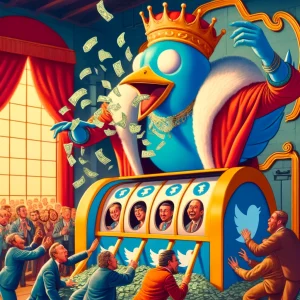TL;DR Breakdown
- Critics warn that celebrities who embrace and endorse NFTs could be downplaying risks.
- NFT celebrity endorsement is likened to FOMO.
The “crypto hustle” has critics worried that women who admire internet celebrities and stars may be susceptible to being entrapped. According to a study by The Washington Post, fans of famous actresses like Gwyneth Paltrow and Mila Kunis could be fooled into investing in digital currencies by the market reality of such investments.
Celebrities focus on gender equality in the NFT space
According to the documented report, a Zoom call in January saw both female celebrities urging more than 5,000 ladies in attendance to get involved in the primarily male-dominated business of crypto.
“We have watched many of these bros get together and earn a lot of money,” said Paltrow, sporting a black turtleneck, sun-kissed glow, and a disarming smile. “We deserve to be in this space just as much.
Celebrities’ endorsements—of a product, a brand, a concept, or even a hairstyle—have been famous for ages. However, they’ve gotten increasingly flocking in recent years, as stars have created their direct-advertising platforms on social media.
Something is unsettling about celebrities encouraging their followers to invest in NFTs without telling them the risks. With NFTs, the world may have unwittingly arrived at the logical conclusion of celebrity endorsements.
Many celebrities have gotten involved with NFT endorsements, and the results have been disastrous. One such example is Laurent Correira, a well-known French influencer and reality TV star who spearheaded a $960k NFT rug pull (according to Cryptopolitan).
Celebrities are no longer limited to merely advertising NFTs; they’ve begun building their own NFT platforms. Mila Kunis got involved in the digital asset business, producing a cartoon series with her spouse Ashton Kutcher. The animated program utilises NFT digital art as its content.
Mila Kunis stated that women have long been conditioned to be risk-averse, and she was willing to take chances to see what happens. Women have long had restricted entry into technological riches, with a similar pattern now repeating itself in the crypto world.
According to the Washington Post report, according to a CNBC poll in 2021, men invest in cryptoassets at a rate of nearly 2:1 over women. Another Quinnipiac University poll released in March found that while 43% of women had heard of NFTs, 61% of men had.
These celebrities aren’t the only ones to benefit from a more gender-diverse crypto community. Gender-diverse NFT projects, several of which give portions of their profits, have won social media followers, Hollywood deals, corporate sponsors, and celebrity fans due to their efforts.
For example, Boss Beauties, an NFT collection of “beautifully diverse, empowered women,” has agreements with Barbie and Neiman Marcus. Eva Longoria also bought two NFTs from the CryptoChicks collection, which celebrates all women’s unique, varied beauty throughout the world.
Could NFTs’ celebrity endorsements be blindsiding investors?
Critics, however, see a resurgence of the girlboss archetype in specific NFT projects. The platform had start-up founders who saw their capacity to break into the boys’ club as progress for the greater good.
These NFT companies, like the girlboss, blend hustle culture with the language of social justice, blurring the distinction between community and business; female influencers use empowerment as a customer acquisition strategy.
Despite the celebrity investors’ encouraging words, some critics claim that financial inclusion initiatives are repeating the same power structures that kept previous generations of female entrepreneurs from making actual wealth.
Adrienne Young, a social media strategist who assists women of colour get involved in the cryptocurrency sector, says that female entrepreneurs are now filling the same power gaps that have kept females out of the crypto business.
“These projects are very clearly centering mostly White women or mostly women who already come from a lot of privilege,” said Adrienne Young. “It felt like buzzwords for people to eat up, so they felt good about supporting a women-led project.”
Critics say that attempts to get women interested in cryptoasset investing have overemphasised the financial upside while downplaying the danger. Faith Love, an artist and community manager at MetaMask, said the pandering towards females in crypto was “bait” used by project creators to generate money and economic power.
Gender inclusivity is a more delicate sales pitch than celebrity TV commercials and sponsored posts. However, these women-focused projects build on the same thinking that drives the rest of the crypto market: FOMO or fear of missing out.
Sceptics claim that these efforts overpromise the financial benefits while glossing over the risks, propping up an overheated market rife with scams and hacks. Meanwhile, crypto enthusiasts are vexed by how high-profile projects have disregarded previous diversity initiatives and allegedly stolen ideas from young women of colour without citation.





